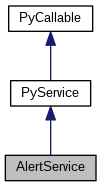|
EvEmu
0.8.4
11 September 2021
|
|
EvEmu
0.8.4
11 September 2021
|
#include "AlertService.h"


Public Member Functions | |
| AlertService (PyServiceMgr *mgr) | |
| virtual | ~AlertService () |
 Public Member Functions inherited from PyService Public Member Functions inherited from PyService | |
| PyService (PyServiceMgr *mgr, const char *serviceName) | |
| virtual | ~PyService () |
| virtual PyResult | Call (const std::string &method, PyCallArgs &args) |
| const char * | GetName () const |
 Public Member Functions inherited from PyCallable Public Member Functions inherited from PyCallable | |
| PyCallable () | |
| virtual | ~PyCallable () |
Protected Member Functions | |
| PyResult | Handle_BeanCount (PyCallArgs &call) |
| PyResult | Handle_BeanDelivery (PyCallArgs &call) |
| PyResult | Handle_GroupBeanDelivery (PyCallArgs &call) |
| PyResult | Handle_SendClientStackTraceAlert (PyCallArgs &call) |
| The client sends us a python stack trace, from which we could make up what we did wrong. More... | |
 Protected Member Functions inherited from PyService Protected Member Functions inherited from PyService | |
| PyObject * | _BuildCachedReturn (PySubStream **result, const char *sessionInfo, CacheCheckTime check) |
| virtual PyBoundObject * | CreateBoundObject (Client *pClient, const PyRep *bind_args) |
| virtual PyResult | Handle_MachoResolveObject (PyCallArgs &call) |
| virtual PyResult | Handle_MachoBindObject (PyCallArgs &call) |
 Protected Member Functions inherited from PyCallable Protected Member Functions inherited from PyCallable | |
| void | _SetCallDispatcher (CallDispatcher *d) |
Protected Attributes | |
| Dispatcher *const | m_dispatch |
| PyTraceLog * | traceLogger |
 Protected Attributes inherited from PyService Protected Attributes inherited from PyService | |
| PyServiceMgr *const | m_manager |
Additional Inherited Members | |
 Protected Types inherited from PyService Protected Types inherited from PyService | |
| enum | CacheCheckTime { check_Always = 0, check_Never, check_in_year, check_in_6_months, check_in_3_months, check_in_1_month, check_in_1_week, check_in_1_day, check_in_12_hours, check_in_6_hours, check_in_3_hours, check_in_2_hours, check_in_1_hour, check_in_30_minutes, check_in_15_minutes, check_in_5_minutes, check_in_1_minute, check_in_30_seconds, check_in_15_seconds, check_in_5_seconds, check_in_1_second, _checkCount } |
 Static Protected Attributes inherited from PyService Static Protected Attributes inherited from PyService | |
| static const char *const | s_checkTimeStrings [_checkCount] |
Definition at line 33 of file AlertService.h.
| AlertService::AlertService | ( | PyServiceMgr * | mgr | ) |
|
virtual |
Definition at line 50 of file AlertService.cpp.
References m_dispatch, SafeDelete(), and traceLogger.

|
protected |
Basically BeanCount means that a error has occurred in the client python code, and it asks the server how to handle it. : in normal operations we should send back a unique mErrorID to the client, it saves it and sends the stack traces to us through BeanDelivery every 15 minutes. When we are in developer mode we should send back PyNone asking the to send us the stack trace immediately.
Definition at line 62 of file AlertService.cpp.
References _log, PyStatic, sConfig, PyTuple::size(), and PyCallArgs::tuple.
Referenced by PyCallable_Make_InnerDispatcher().


|
protected |
The client "stacks" up the python "stack" traces and sends them every 15 minutes. : this process is only useful when we supply the client with a valid mErrorID. meaning that we should code a mErrorID tracker for it. To handle these.
Definition at line 85 of file AlertService.cpp.
References _log, PyStatic, PyTuple::size(), and PyCallArgs::tuple.
Referenced by PyCallable_Make_InnerDispatcher().


|
protected |
Definition at line 95 of file AlertService.cpp.
References _log, PyStatic, PyTuple::size(), and PyCallArgs::tuple.
Referenced by PyCallable_Make_InnerDispatcher().


|
protected |
The client sends us a python stack trace, from which we could make up what we did wrong.
| [in] | call | is the python packet that contains the info for this function |
Definition at line 113 of file AlertService.cpp.
References _log, is_log_enabled, PyTraceLog::logTrace(), PyStatic, sConfig, PyTuple::size(), traceLogger, and PyCallArgs::tuple.
Referenced by PyCallable_Make_InnerDispatcher().


|
protected |
Definition at line 39 of file AlertService.h.
Referenced by ~AlertService().
|
protected |
Definition at line 48 of file AlertService.h.
Referenced by Handle_SendClientStackTraceAlert(), and ~AlertService().